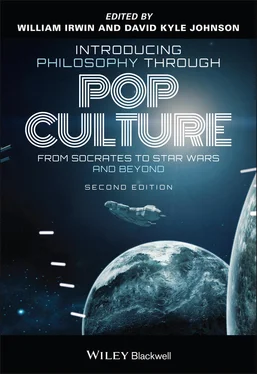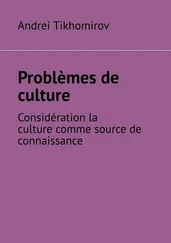1 ...8 9 10 12 13 14 ...34 What both of these interpretations show is that there are multiple levels of censorship that need to be questioned. On the one hand, there is the censorship that simply looks at vulgarity, and decides what can and cannot be seen, based upon social norms. South Park clearly questions this sort of censorship, saying so often what cannot be said and challenging social forms of repression. But, if part of South Park 's message is the need for thinking, then it also questions how television, by fulfilling our wish for mindlessness, supposedly represses thinking. Of course, such mindlessness can't simply be blamed on one's parents, or television corporations, or two doofuses from Colorado who can't draw straight. Like the mindless Athenians who were to blame for their own ignorance, or Eichmann's responsibility when he thought he was just obeying the law, if we really hold a mirror up to ourselves, as political philosophers say, we will find that our own mindlessness is the heart of Wal‐Mart. Like Socrates, perhaps South Park – and Kyle and Stan more specifically – presents us with a way to reflect on what we think we really know, and through reflection move beyond our mindlessness.
The Talking Cure for Our Culture
By ceaselessly testing the limits of our culture's tolerance, South Park asks us to examine the things we think we know, why certain words and actions are prohibited, what we desire, and what we are teaching our children. Through its provocation, it asks us to think about what is truly harmful and what issues we really should be outraged about. Breaking the silence of our culture's repressions could be the starting point for a Socratic dialogue that helps us to think, analyze our desires and aggression, and become good. If we take the opportunity to discuss the show, why it is funny, and what it tells us about our culture and our own desires, then the show need not be mindless, vulgar, or corrupting, but rather a path to thinking that helps us to live with one another, and with ourselves. 15
1 1For pop culture resources and philosophical resources related to this chapter please visit the website for this book: https://introducingphilosophythroughpopculture.com.
2 2Plato (1981). Apology . In: Five Dialogues: Euthyphro, Apology, Crito, Meno, Phaedo (trans. G.M.A. Grube). Indianapolis, IN: Hackett Publishing . Also see Xenophon (1965). Recollections of Socrates, and Socrates' Defense before the Jury (trans. A. Benjamin). Indianapolis: Bobbs‐Merrill.
3 3Apology, 30.
4 4Apology, 28–29.
5 5H. Arendt (2003). Personal responsibility under dictatorship. In: Responsibility and Judgment , 40–41. New York: Schocken.
6 6Arendt, 49.
7 7See Plato (1991). The Republic of Plato (trans. D. Bloom). New York: Basic Books ; Aristotle (1999). Nicomachean Ethics , (trans. T. Irwin). Indianapolis, IN: Hackett Publishing .
8 8Apology, 41.
9 9Arendt, H. (1964). Eichmann in Jerusalem: A Report on the Banality of Evil , 135–150. New York: Viking Press .
10 10Arendt, Some questions of moral philosophy. In: Responsibility and Judgment, 96–7.
11 11I owe this insight to Kyle Giroux.
12 12See Freud, S. (1965). The Interpretation of Dreams , 156–166. New York: Avon Books.
13 13For more on this issue, see Lear, J. (1990). Love and Its Place in Nature: A Philosophical Interpretation of Freudian Psychoanalysis . New York: Farrar, Strauss, and Giroux .
14 14Freud (1993). Wit and Its Relation to the Unconscious (trans. A.A. Brill), 261–73. New York: Dover.
15 15My thanks to Kyle Giroux for his work as a “South Park consultant” and his suggestions for ways to update this version. Additional thanks to Keith Wilde and Nicole Merola for their comments and suggestions on this essay, and to numerous students from Endicott College for their discussions of an earlier version of the essay. Errors remain my own.
2 The Chewbacca Defense: A South Park Logic Lesson
Robert Arp
The creators of South Park are aware of logical principles and purposely violate them to show the absurdities associated with certain beliefs, opinions, ideas, and arguments. In fact, much of South Park 's humor concerns logical violations and the contradictions and problems that result. Logic is the study of the principles of correct reasoning associated with the formation and analysis of arguments. Using examples from South Park , this chapter offers a short logic lesson as an introduction to what philosophers do when they put forward and critique arguments. Topics covered include the parts of an argument (premise and conclusion), premise‐ and conclusion‐indicating words, deductive versus inductive arguments, good versus bad arguments, and a few common fallacies such as the famous Chewbacca defense utilized by the cartoon Johnny Cochran in the episode “Chef Aid.”
The Goth kids on South Park crack me up because they remind me of the Goths at the high school where I taught in the early 1990s, sitting around all looking like the bastard children of Robert Smith from The Cure and an 80s‐ish Tori Amos. In fact, my first reaction to seeing a group of kids dressed like that at a mall is automatically to think, “They're all saturnine, shady, surly, and, of course, suspect.” Alliteration aside, that conclusion is unfair, isn't it? It's an example of the fallacy of hasty generalization , actually. A fallacy occurs when we inappropriately or incorrectly draw a conclusion from reasons that do not support the conclusion, and hasty generalization is a common fallacy often lampooned on South Park . In a hasty generalization, a person fallaciously draws a conclusion about characteristics of a whole group based upon premises concerning characteristics of a small sample of the group. Most times, when we think to ourselves “they're all like that” in talking about anything – cars, movies, Goths – based upon a small sample of the group we're talking about, we commit a hasty generalization. There is usually no way definitely to conclude something about the characteristics of an entire group since we have no knowledge of the entire group. The next member of the group we encounter may turn out to have different characteristics from members of the group we know thus far. In fact, many of those little Goths at the high school where I taught were not at all saturnine, shady, or surly once you chatted with them, and I was reasoning fallaciously by immediately jumping to that conclusion.
Any form of prejudice and stereotyping, by definition, constitutes a hasty generalization.
Consider the way Kyle's Jewish cousin, Kyle 2, is stereotyped in “The Entity,” or how Mexicans are type‐cast as lazy, gay people are all flamboyant like Big Gay Al or Mr. Slave, and African Americans are reverse type‐cast as “richers” in “Here Comes the Neighborhood.” Even Officer Barbrady commits the fallacy of hasty generalization in “Chickenlover” when, after reading a copy of Ayn Rand's Atlas Shrugged , he concludes that all books must be this bad, and reading “totally sucks ass.” The creators of South Park play on people's hasty generalizations to make their points in episode after episode, probably because not only is prejudice something that morally harms people, but it also logically “harms” people's thinking as well.
This chapter offers a short logic lesson as an introduction to what philosophers and other critical thinkers do when they put forward and critique arguments. Logic is the study of the principles of correct reasoning associated with the formation and analysis of arguments. 1 The creators of South Park , for the most part, are aware of these logical principles, and purposely violate them to show the absurdities associated with certain beliefs, opinions, ideas, and arguments. In fact, much of South Park 's humor concerns logical violations and the absurdities, contradictions, and problems that result. The way people reason correctly, or incorrectly, has real consequences. It affects the policies they adhere to, the laws they make, the beliefs they are willing to die for, and the general way in which they live their lives.
Читать дальше












